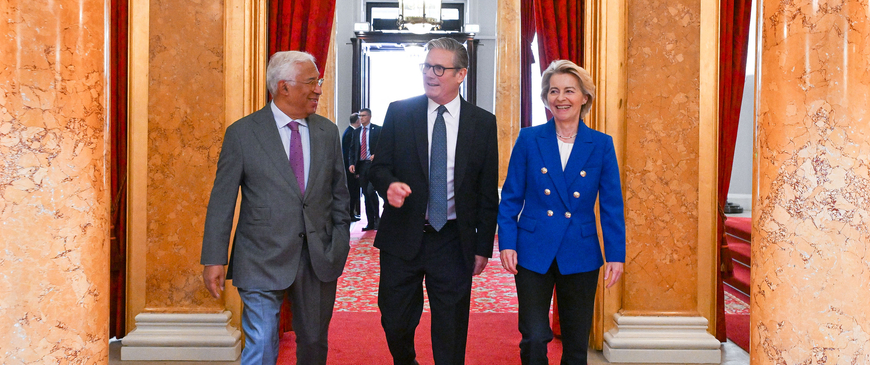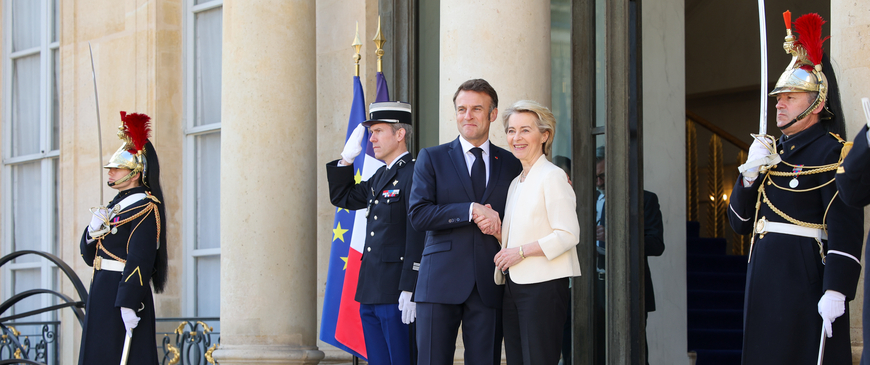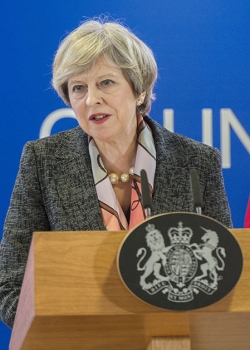Research
Macron wins majority in French parliament, pollsters project
18 June 2017
Bloomberg
“Though Emmanuel Macron and Tony Blair have much in common, Blair never sought to smash the UK’s party system, which EM has done in France,” Charles Grant, director of the Centre for European Reform, said in a Twitter posting, referring to the British prime minister who won three straight elections from 1997.
Seizing the initiative
16 June 2017
Financial Times
The question is whether in 10-15 years the EU side will regret not taking a more proactive approach based on how close a relationship the bloc actually wants with Britain. Here Simon Tilford and John Springford of the Centre for European Reform have some ideas. If Britain makes some progress on the divorce issues, they want the EU to respond “by laying out in public, and in some detail, the four options facing Britain”.
Now May should say sorry to our EU friends
15 June 2017
The Times
It’s no poker game because, as Simon Tilford of the Centre for European Reform points out, in poker the power of a hand is that it’s secret. Europe knows exactly how few cards we have to play. And if May’s position was weak a month ago, it is infinitely weaker now.
European support for EU surges in wake of Brexit vote
15 June 2017
Financial Times
Charles Grant, director of the Centre for European Reform, said a growing economy and ebbing of the worst of the refugee crisis had created a more positive backdrop for the EU in the past year, even as specific doubts remained. “In terms of image, which is hugely influential, things are looking up,” he said. “With countries doing better, you would expect a bit more optimism.”
Brexit talks start Monday: The UK still lacks a plan
15 June 2017
CNN Money
"The EU can only negotiate once the UK has come to a consensus on how to proceed -- which will only happen once British politicians openly debate Brexit's dilemmas," said Simon Tilford, deputy director of the Centre for European Reform. ...Tilford said that if May sticks to her uncompromising approach, the EU will have "no option but to respond in kind."
Brexit briefing: Honest options
15 June 2017
Financial Times
British politicians are still avoiding the hard truths about leaving the EU, say Simon Tilford and John Springford of the Centre for European Reform. To force an honest debate, they suggest that the EU-27 present Britain with four options for Brexit.
EU opens door for Brexit retreat, but at a price
14 June 2017
The Independent
It is worth showing a generosity of spirit according to Ian Bond, the director of foreign policy at the Centre for European Reform. “If you see your friend about to jump off a cliff, would you try to persuade them things aren’t so bad? Or shrug, say ‘Your choice’ and walk off?” he said.
Ruth Davidson tells Theresa May to set new course for a softer Brexit
13 June 2017
The Times
Charles Grant, director of the Centre for European Reform, said the new political reality meant there was simply no parliamentary majority for the kind of Brexit put forward by Mrs May during the election campaign. “My view is that if Mrs May is to have any future as prime minister she has to change the substance of her line on Brexit,” he said.
Britain's Theresa May comes under pressure to soften her stance on Brexit
13 June 2017
The Washington Post
“We now have a Parliament that’s gridlocked,” said John Springford, research director at the CER. “It doesn’t appear that there’s a majority for hard Brexit, a majority for soft Brexit, or certainly not a majority for remain. It’s a very confused picture.”
EU migration showdown: Divide deepens after Brussels launches legal action against Hungary, Poland and Czech Republic
13 June 2017
The Telegraph
"There are no winners in this spat over the re-location policy," said Agata Gostynska-Jakubowska, eastern EU expect at the Centre for European Reform, predicting that case could ultimately reach the European Court of Justice. ..."The public will almost certainly see its actions as an attack on the countries’ sovereignty. Governments will probably reinforce this perception by their domestic narrative," she added.
European defence spending question casts long shadow
13 June 2017
Shephard
This is a crucial aspect of defence spending, said Sophia Besch, research fellow at the Centre for European Reform. "The real issue is that if countries raise defence spending on a national level, that doesn’t necessarily mean that it goes towards research and development or towards procurement. It could just mean that they’re investing in jobs at home," she said.
Hard or soft: How will the UK take its Brexit?
13 June 2017
Deutsche Welle
"The mandate for the government to negotiate whatever kind of Brexit it wants - and which was shaping up to be very hard - has now gone," Simon Tilford of the Centre for European Reform told DW. "It's very, very hard to see - or impossible to see, really - how the government could walk away with no deal, and it's very hard to see how the government could push that kind of hard Brexit."
In Britain's post-election disarray, can a Brexit consensus be found?
13 June 2017
The Christian Science Monitor
“With her party divided and no majority in Parliament, May will run the constant risk of one side or another rebelling,” predicts Simon Tilford, deputy director of the Centre for European Reform. “It is difficult to see how she can pursue any Brexit in these circumstances.”
Großbritannien: Von oben herab
13 June 2017
Die Zeit
Simon Tilford, stellvertretender Direktor des Centre for European Reform, formuliert es so: "Dass sie direkt in die Brexit-Verhandlungen gehen will, ist für unseren Ruf sehr schlecht. Großbritannien wirkt unseriös, ehrlich gesagt, sogar wahnhaft. Es wäre ehrlicher gewesen, wenn May zurückgetreten wäre und den Europäern signalisiert hätte, dass Großbritannien mehr Zeit braucht. Doch für sie sind die Brexit-Verhandlungen der einzige Weg, um an der Macht zu bleiben. Wenn es zu Verzögerungen käme, könnte sie von ihrer Partei weggeputscht werden."
BBC Radio 4: Germany - Anxious Giant
12 June 2017
Sophia Besch talks to Radio 4 about the standing of the German army in Germany and its relationship with the public (from 02.30).
Germany: Reluctant military giant?
12 June 2017
BBC News
For a long time, says military expert Sophia Besch from the Centre for European Reform: "If you were a soldier [in Germany] you could not really ride a train in your uniform. You'd be approached by passengers calling you a 'murderer'."
Le Brexit à la merci de l’instabilité politique qui règne en Grande-Bretagne
11 June 2017
Les Echos
« Face aux rebelles qui menacent de voter contre elle des deux côtés, Theresa May aura le plus grand mal à définir une position de négociation solide et à s'y tenir », prédit Simon Tilford, du Centre for European Reform. La négociation pourrait certes démarrer le 19 juin mais elle risque de « caler très rapidement » à cause de l'incertitude qui règne en Grande-Bretagne.
May wanted a mandate for a hard Brexit. Now Europe expects a softer tone
11 June 2017
The Observer
Prime minister's crumbling authority offers a new chance for compromise – and the EU could scale back its demands.
Die Tür zurück zur EU steht einen Spaltbreit offen
11 June 2017
Die Welt
Die britische Parlamentswahl am Donnerstag hat der Premierministerin nicht das von ihr erhoffte „starke Mandat“ gegeben, im Gegenteil. Aber das heißt noch lange nicht, dass der Brexit nun ganz anders ausgeht. Dass die Briten doch noch die größte Nähe zur EU oder gar den Ausstieg aus dem Ausstieg suchen. Gerade eine angeschlagene Premierministerin „könnte jetzt noch mehr auf die Konfrontation mit Brüssel setzen“, warnt Simon Tilford vom Centre for European Reform.
El patinazo de May agrava el riesgo de un 'brexit' brutal y sin acuerdo
10 June 2017
Cinco Dias
El impacto de un brexit sin acuerdo sería peligroso para ambos lados del Canal de la Mancha, pero potencialmente devastador para Reino Unido, según un análisis del instituto londinense Centre for European Reform (CER), previo a las elecciones del 8 de junio. “La UE puede mitigar sus daños y castigar a Gran Bretaña en áreas que no le supongan un gran coste”, advertían los autores del análisis, John Springford y Simon Tilford. Y, en cambio, auguran a Reino Unido un escenario de pesadilla con una devaluación de la libra esterlina hasta la paridad con el euro y el dólar; una escalada de la inflación; y “una profunda recesión” con grave daño para las finanzas públicas del Reino Unido.













